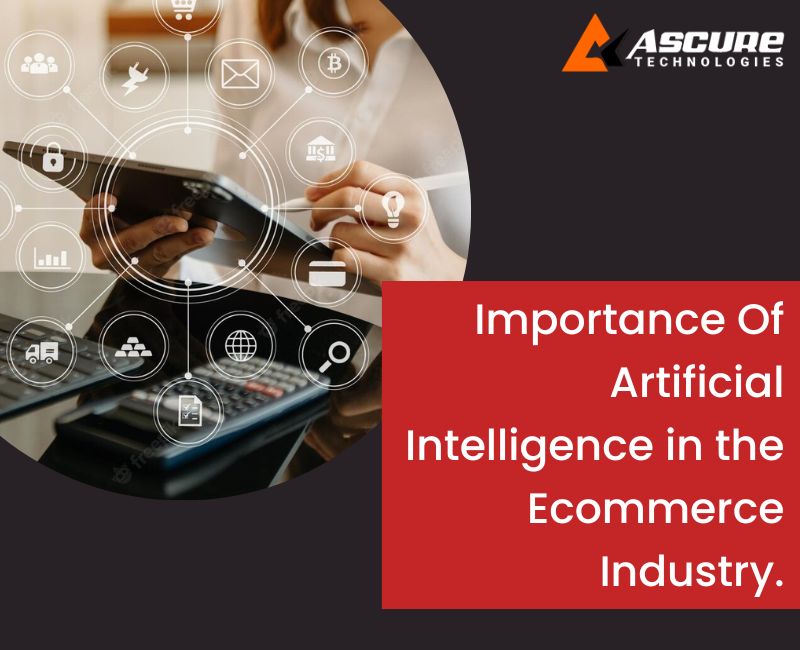
Table of Content
- About Role of Artificial Intelligence In E-commerce Industry.
- How does Artificial Intelligence Benefits the eCommerce Industry?
- What are the difficulties faced by Artificial Intelligence in Ecommerce?
- What is the use of Artificial Intelligence In ecommerce?
About Role of Artificial Intelligence in the ecommerce Industry
In recent years, technology has completely transformed the business method and increased the market standard. Many believe that Artificial Intelligence has ruled over the growth of Business success.
Artificial Intelligence increases the ecommerce experience by examining the data and behavioural patterns. We are familiar with it as a trend, but this also provides excellent opportunities to strengthen your business with the best solutions.
80% of the people state that uniting AI into sales and Marketing has increased their revenue. This data will make you more interested in Artificial Intelligence in the Ecommerce Industry.
In this blog post, you will know answers to various basic questions such as what is the role of Artificial Intelligence in the ecommerce industry, What are the Challenges of AI in the ecommerce industry, What are the benefits of AI ecommerce and How will AI affect ecommerce industries.
Let’s start with different Questioning.
What is Artificial Intelligence?
The term “artificial intelligence” refers to a computer system capable of performing tasks expected of humans, such as visual perception, speech recognition, decision-making, and language translation.
How does Artificial Intelligence Benefits the eCommerce Industry?
Robust Marketing Strategies
To expand the company, managing marketing spending is essential. Small firms today leverage AI marketing solutions with limited budgets. Understanding advertising operations and performance and making wise recommendations aid in their expansion.
Keeping an eye on the budget can save money on additional marketing services that don’t produce worthwhile outcomes. Artificial Intelligence aids in improving customer connectivity, locating new audiences, and utilizing digital branding to attract attention across many platforms.
Personalized Recommendation
The app can predict data and algorithms according to artificial Intelligence, known as machine learning. This is utilized in the e-commerce industry to determine the behaviours and interests of the customers based on their search history. Following configuration, the ML will examine purchasing patterns to tailor the user’s shopping experience. This implies that you can utilize artificial Intelligence to customize product pairings, promotions, and suggestions for specific clients. This will broaden people’s knowledge and significantly boost business sales.
The efficient sales process
By gathering information about your consumers, automating follow-up queries about abandoned carts, and more, using AI can help you establish a more effective sales process. By encouraging clients to interact with chatbots for straightforward inquiries, you can assist in moving them down the funnel.
Smart Decision making
The management and pricing of ecommerce operations are both directly connected with AI. Retailers may use big data to make decisions that are based on insightful information. Since it can be difficult to take into account all the pertinent elements of the rivals, product pricing is not only a guess.
When you work with an e-commerce SEO agency, they will offer the best price so that companies can manage their inventories effectively and compete successfully in the market. This is accomplished by quickly obtaining actionable insights from analyzing a sizable volume of data to make the best decisions for your company.
Once the appropriate data is available, it will be easier to decide on different items and business decisions that could influence productivity, conversions, and sales.
Chatbots for direct touch
A chatbot is a computer software designed to have online conversations with people. They take ownership of marketing and operational activities to give clients and provide outstanding customer service. In its correct answers, they will retrieve the information they need, such as product specifics, delivery conditions, and quantities.
The speed of technological progress has drastically altered customer expectations, and e-commerce is now focused on giving each person a pleasant shopping experience. A variety of client interactions brings on the need to buy goods or services from the store.
Gaining the attention of customers requires the use of a variety of media, including images, music, texts, and more. It contributes significantly to the expansion of the company as well. Brands trying to thrive in this cutthroat environment
What are the difficulties faced by Artificial Intelligence in Ecommerce?
Having the ideal targeted campaign based on audience, geographical area, interest, and other aspects is the most considerable difficulty for an online store. Taking all of the benefits of Artificial Intelligence, it is vital to know the Challenges of AI in e-commerce. The following are some of the difficulties with e-commerce in Artificial Intelligence:-
Scalability
Online stores generate unpredictable amounts, sizes, and data speeds, but they expect Artificial Intelligence technologies to respond within a reasonable amount of time.
Human Error
Artificial Intelligence is technology, not error-proof, but they are Blessing for e-commerce.
Cyber Security
A strong cybersecurity programme that addresses Artificial Intelligence risks. It is crucial because many harmful software targets online shops that use AI techniques and technology.
Privacy Concern
When working with Artificial Intelligence-driven systems, ecommerce stores are particular to security and privacy risks due to the sensitive data they handle. Giving both novices and professionals equal weight, the technology gets rid of mistakes and prejudice from people.
What is the use of Artificial Intelligence In ecommerce?
Product Recommendations
The artificial tool collects big data to know the customer shopping habits, which helps Business owners to find out what their customers want to buy. The Appropriate Artificial Intelligence system will examine information that assists in Customizing the product recommendations. It will assess customer behaviour and make refined predictions about the client’s requirements.
The AI tool will utilize collaborative filtering during ecommerce marketing, which draws on the past and broader trends of ecommerce stores. It will update the machine learning-driven recommendations.
Pricing Optimization
With AI-enabled dynamic pricing, you can adjust the price of your product based on supply and demand. Today’s systems can forecast when and what to discount based on the right data, dynamically determining the minimal discount required for the sale.
Enhanced Customer Service
With the help of chatbots and virtual assistants, you can provide the impression of providing higher touch customer assistance. Although these bots aren’t entirely self-sufficient, they can help with straightforward transactions so that live support personnel can concentrate on more complicated problems.
The 24*7 availability of virtual agents allows for quick resolution of basic queries and issues at any time of day without keeping your customers waiting.
Customer Segmentation
Ecommerce companies may now better understand their customers and spot emerging trends thanks to increased access to company and customer data as well as computing capacity.
“AI systems can investigate highly complicated and varied alternatives for consumer engagement very fast, and they can continuously improve their performance as more data becomes available,” according to an observation from Accenture. To achieve precision, marketers can set parameters and let AI optimize and learn.
Smart logistic
The concept of smart logistics or intelligent logistics refers to using real-time real-time real-time information with sensors, RFID tags, and other technologies to manage Inventory and forecast demand. As a machine learning system learns over time, it becomes more intelligent and can make better predictions for supply chain and logistics operations.
Sales and Demand forecasting
Especially in World after Covid-19, Artificial Intelligence plays an essential role in planning your Inventory on real-time and Historical data. Artificial Intelligence helps a lot to you in planning for Inventory. A recent report suggested that real-time customer analytics will continue to be crucial for determining prices and targeting marketing to consumers experiencing shifts in consumer demand.













